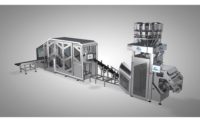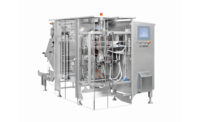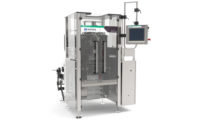For snack food and select baked goods producers today, flexibility is the most sought-after feature of form/fill/seal (FFS) packaging equipment. Manufacturers also seek modular designs that provide scalable solutions and flexible layout configurations.
This is all due to the wide variety of interchangeable bag styles—flat-bottom, gusset, four corner seal, edge back seal and pillow—that consumers look for at retail today. Food processors also are seeking machines that can handle high-quality materials and keep waste to a minimum.
Affecting change
Innovative packaging materials, formats and sizes continue to be top-of-mind among consumers, according to Tom Egan, vice president, industry services, PMMI, The Association for Packaging and Processing Technologies, Reston, VA. “Packaging not only serves as a key platform for brands to enhance shelf appeal and showcase their commitment to health and wellness, it also helps brands accommodate different lifestyles. Diverse size and format varieties make it easier for consumers to find options that fit their lifestyles,” he says.
One emerging consumer trend is a push toward a health-conscious type of snacking, which is prompting growth in premium-appearance package styles featuring high-quality films and graphics, says Jason D’Arcy, product manager, Kliklok-Woodman, Decatur, GA. “This requires FFS machines that can handle higher-cost materials and keep waste to a minimum. We also are seeing a push to bag styles beyond the standard pillow pouch, which requires FFS machines that can be easily configured to produce multiple pack styles,” he notes.
In order to design an optimal system solution, bakers and snack producers of all sizes need to focus on combining flexibility and automation. Because they often need to pack different products on the same line, packaging systems must have the flexibility to adapt quickly to changing demands, while also being able to handle different pack styles and configurations.
Creative packaging also comes into play when designing FFS equipment. Brand owners are becoming more creative in shaping flexible pouches that are more appealing to consumers. These pouches often feature closures, stand-up capabilities and other features.
Changes in consumer eating habits have pushed retailers’ demands for premium-looking, single-serve portions. A good example is the growing popularity of stand-up pouches for snacks that enhance shelf appeal and consumer experience in comparison to traditional pillow bags. To fill this need, Bosch Packaging Corp., New Richmond, WI, offers the Model SVE 2520 DZ VFFS (vertical FFS) machine for producing Doy Zip bags, which protect food contents for future consumption and allow for easy opening and reclosing, says Kelly Meer, product manager.
Flexible innovations
Triangle Packaging, Chicago, has introduced two vertical FFS machines within the last year, both of which serve the growing need for flexibility. The Model XYRJ features an easily rotatable sealing jaw that allows producers to run pillow bags, gusseted bags, three-sided seals and Doy Bags on the same machine. An optional zipper applicator helps meet consumer demand for convenient, re-closable packaging.
“This past spring, Triangle Packaging introduced ultrasonic sealing as an optional feature on the Model XYRJ. Ultrasonic sealing technology provides several benefits, including 100 percent seal integrity; reduced rejects; and product, labor and material savings,” says Kim Magon-Haller, marketing manager.
Reiser, Canton, MA, recently added Variovac horizontal FFS machines to its equipment line. This includes the compact Optimus and the larger Primus. Both machines feature a modular design, allowing them to be built to meet individual packaging requirements. Both feature Variovac’s RAPIDAIRSYSTEM. “For semi-rigid and flexible film applications, this system provides precise forming of the bottom web without the need to pre-heat the film; this allows for faster production speeds while freeing up space in the loading area,” says John McIsaac, vice president of strategic business development.
To address growing flexibility needs, Bosch Packaging recently introduced a packaging solution for the flexible flow-wrapping of cookies. The FFS system is comprised of a loader, feeder and horizontal flow wrapper. It is capable of gently handling a wide range of products, including rectangular, square, round and sandwich cookies with quick changeovers.
The Frontier vertical FFS bag maker from Kliklok-Woodman is available in two configurations: one for cookies, crackers and confections, the other for traditional salted snack foods, such as potato chips and tortilla chips. Speeds of up to 80 bags per minute are possible, and the machine interfaces with a variety of filling systems, including combination scales, volumetric cup fillers and augers. Kliklok-Woodman recently was acquired by Bosch Packaging Corp.
Tna, Dallas, offers the tna robag series of packaging systems, which can reach speeds of up to 250 bags per minute. The company recently introduced a continuous gas sampler that can be integrated into the system. It monitors the residual oxygen level in every package. If it detects that the gas content is out of range, the system automatically stops the packaging process. This reduces gas consumption, lowering the number of product rejects, and saves time and labor costs associated with manual testing.
Bossar USA, Lawrenceville, GA, offers a line of vertical FFS machines that produce a variety of packaging styles, such as pillow bags, gusseted pillow bags, flat-bottom and flat-bottom bags with corner seals. Additional options such as zipper applicators, labelers and valves can be integrated into the machines. Features include a compact frame with fewer parts and quick size changeovers.
Branson Ultrasonics, a business of Emerson, Danbury, CT, recently introduced an ultrasonic-sealing VFFS system that can process package sizes from 2.5 in. wide by 3 in. long to 12 in. wide by 20 in. long, with no tool changeover required. The company notes that it provides multiple advantages over thermal sealing systems, including low energy consumption, narrower seals, less material consumption, elimination of warm-up time and reduced leakage.
Overcoming challenges
Manufacturers face many challenges when designing FFS equipment for bakery and snack plants. One is finding ways to handle products that are sticky, brittle or fragile, or offer varying degrees of density. “Triangle Packaging’s stainless steel design is a popular choice, even for dry environments, because it’s easy to clean and features a frame that is free of crevices. We also deal with a lot of granulated sugar and sugary products such as cereal or marshmallows, in which case we often provide features such as static eliminators and vacuum,” Magon-Haller says.
Because flour dust can pose a challenge, FFS machines must be easy to clean. “Both our Repak and Variovac FFS machines feature wash-down designs with easy access to all areas for inspection and cleaning. Side panels are easily removable, and sloped surfaces allow for fluid run-off,” McIsaac says.
Another common problem that snack and bakery businesses face is retention of good machine operators. “These positions tend to see a lot of turnover. This, in turn, challenges us to design machines that can be operated by a person who has had minimal training. The simpler it is to start the machine and produce good packages, the better it is for our customers,” D’Arcy notes.
All FFS equipment needs to accommodate new food-safety regulations. “When it comes to packaging, food safety is paramount. All tna systems are designed with few moving parts, making them easy to clean. There is less equipment to dismantle, making the process quicker, with fewer places for microorganisms to hide and harmful bacteria to build up,” says Mark Lozano, sales manager, North America. “In addition, our packaging systems use simple gravity to transfer the product from the weigher, through the metal detector and into the forming tube to ensure that any product interference by the equipment is kept to a minimum.”
By positioning the metal detector close to the multi-head weigher, the system is able to take advantage of the path that the product is already travelling, Lozano adds. This allows the detector to run at higher speeds, increasing the rate at which the bagger can produce finished products, while maintaining high sensitivity levels.
Overall, producers are looking for FFS solutions that help ramp-up speed, enhance efficiency for greater volumes and variety, and improve cleanliness, notes Egan. Also, equipment manufacturers must keep in mind the fact that food processors are under pressure to produce larger quantities in tandem with stronger throughput in order to meet consumer demand.
“From a flexibility perspective, FFS equipment needs to accommodate different products and sizes efficiently and safely,” continues Egan. “The Food Safety Modernization Act requires changes to machinery for bakery and snack producers, and this sector will be expected to achieve even higher standards of cleanliness moving forward.”
















